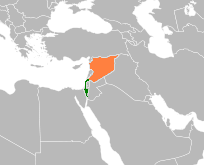| UN Security Council Resolution 235 | ||
|---|---|---|
 Map highlighting Israel (green) and Syria (orange) | ||
| Date | June 9 1967 | |
| Meeting no. | 1352 | |
| Subject | The situation in the Middle East | |
Voting summary |
| |
| Result | Adopted | |
| Security Council composition | ||
Permanent members | ||
Non-permanent members | ||
| ||
United Nations Security Council Resolution 235, adopted on June 9, 1967, after noting that the governments of both Israel and Syria have accepted the Council's demand for a cease-fire, the Council demanded that hostilities should cease forthwith and requested that the Secretary-General make immediate contacts with the Governments of Israel and Syria to immediately arrange compliance with the cease-fire and to report to the Security Council within 2 hours of the resolution.
Contents
The meeting, requested by the Soviet Union and United States, adopted the resolution unanimously. The same day, Syria and Israel accepted the terms of the resolution. [1]